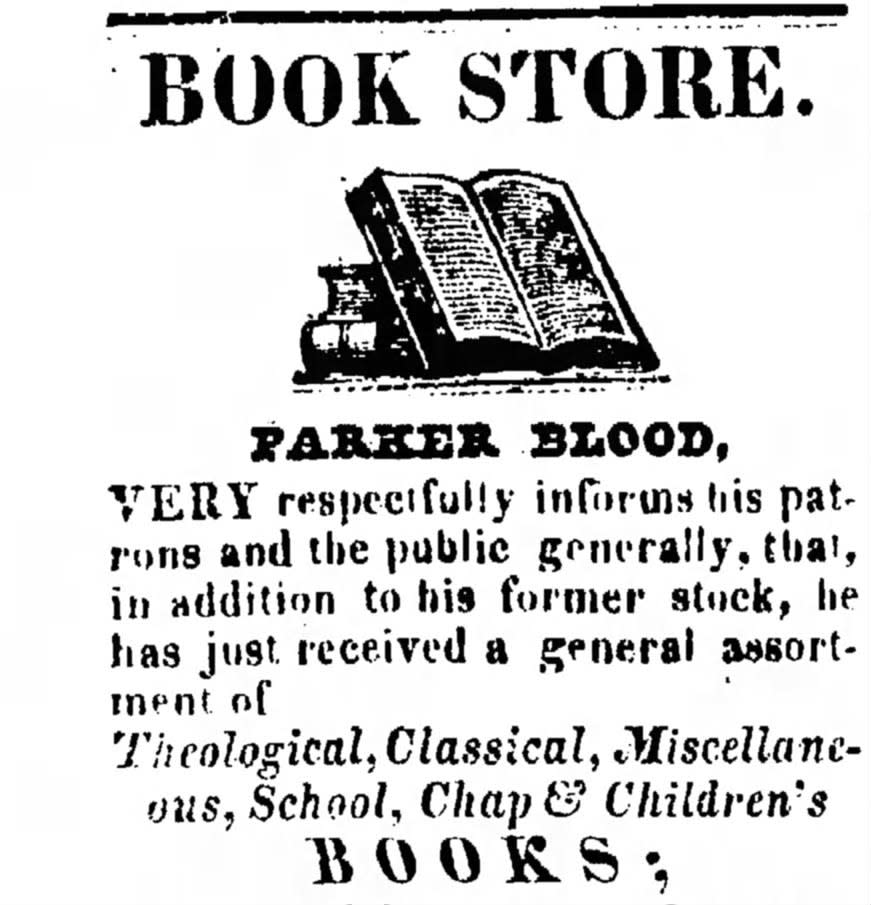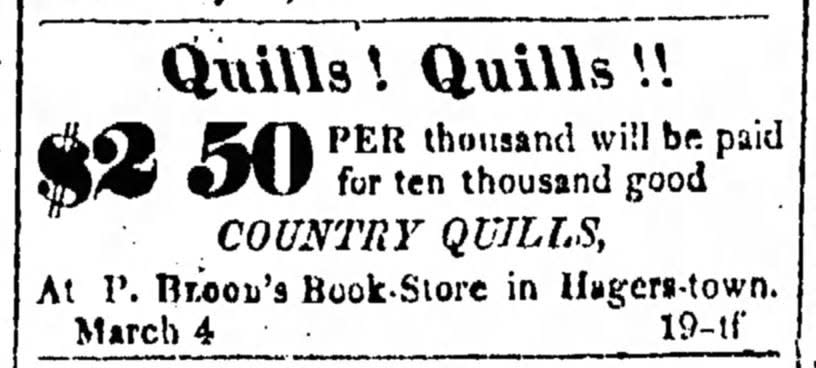Books, gin, quills, confessions and cholera: The short life of Parker Blood, bookseller
- Oops!Something went wrong.Please try again later.
The Washington County Historical Society archives hold many stories of the lives of those who came before us. One of these stories is that of an early 19th-century bookseller named Parker Blood.
Parker Blood was born on July 2, 1800, in New Ipswich, N.H. By age 21, Parker had moved to Chambersburg, Pa., with his brother Samuel. They soon became members of the Falling Spring Presbyterian Church, and in 1821, Parker offered an “Evening School” in Chambersburg.
In addition to teaching, Parker opened a “New Book Store” in Chambersburg. He sold scholastic, classical and theological books, as well as paper, inks, wax and quills. He also vouched to obtain books outside his stock from larger cities for customers within four days.
Thus began his career as a bookseller, one which he pursued into Hagerstown in February 1823, when he opened a “New Book and Grocery Store” on North Potomac Street.

At Parker’s Book and Grocery Store, one could purchase a variety of goods: fresh groceries, liquors such as Holland Gin and Jamaica Spirits, Port and Madeira wines, paper goods and books of all kinds — from medical guides and farmers' almanacs to biographies of Napoleon.
Parker further rooted himself in Hagerstown by becoming a member of the Presbyterian Church at the corner of South Prospect and West Washington streets, newly opened in 1817.
But by 1824, Parker decided it was time for another bookstore venture. He left North Potomac Street for the more prominent location of West Washington Street, opening a new shopfront off Public Square, just east of the Hagerstown Bank.
Shops of all kinds flourished along West Washington Street in the 1820s, including John Kealhofer’s Saddle and Harness Shop, just beside Parker, and John Bell’s pottery shop at Lot 91 — the present location of the Miller House.
Parker’s store also sat opposite the famed Globe Tavern. The Globe, previously known as the Beltzhoover’s Tavern and the Globe Inn, famously hosted George Washington in October 1790.

Parker’s business flourished for the next eight years. He advertised “Cash for Rags!” offering four cents in exchange for “good clean Linen and Cotton Rags,” used to make paper. He also advertised a need for 10,000 “country quills” for his shop.
Parker Blood was a contemporary of Hagerstown’s infamous sheriff and convicted murderer, George Swearingen.
Born in 1800, Swearingen was elected as Hagerstown’s Sheriff in 1827. In 1828, Swearingen murdered his wife before fleeing Hagerstown with his mistress; Swearingen was later arrested and returned to Maryland, then convicted and executed by hanging in Cumberland, Md., in October 1829.
That same month, Parker Blood quickly offered for sale printed copies of The Life & Confession of George Swearingen, a confession Swearingen had written before his death.
Parker was one of many to whom George Swearingen owed money before his death. Swearingen’s house, lots and personal belongings — even his bed, wine glasses and stove pipes — were auctioned off to raise money owed to locals like Blood.
We are left to wonder what books and supplies Swearingen had purchased from Parker’s shop before his death.
In 1829, Parker married Clarine Leeds, the daughter of a New England sea captain who had moved to Hagerstown, in Baltimore. The following year the couple had a daughter they named Elizabeth.
Parker was also a noted grower of excellent corn. An 1830 newspaper article boasted that his garden produced a distinguished crop of “roasting ears” grown from imported Canadian seeds.
The year 1832 brought a cholera epidemic that swept through Europe and North America, killing thousands. Cholera, an acute diarrheal illness spread by bacteria in water, led to severe dehydration and death. American newspapers published the epidemic’s toll as town after town suffered losses.
One of these was Parker Blood, who died at only 32 in October 1832 after a long case of cholera.
“THE CHOLERA…has entirely subsided in our town…two died…Mr. Parker Blood and Mr. Peter Rench, both extensively known as enterprising citizens,” a local article reported.
Newspapers from many states published news of Blood's and Rench’s deaths, including Chambersburg’s The Franklin Repository, The Gettysburg Star & Banner, The Boston Post and The Evening Post.
Blood was buried in the Presbyterian Church cemetery on South Prospect Street. In 1913, this cemetery’s remains were relocated to Rose Hill Cemetery. Parker Blood is buried at Plot No. 52, Section G, although no gravemarker exists. Interestingly, he was reinterred beside his in-laws; Clare had later remarried and eventually moved to Brooklyn, N.Y.
Parker Blood’s story, pieced together from newspapers, census records and remains, brings to life a part of our history that feels both distant and close. A young business owner, Parker moved to a new community to offer the best books in town. He joined a church, started a family, and walked West Washington Street daily. And tragically, he was part of an epidemic that swept through the young country.
Many stories like Parker's are waiting to be uncovered at the Washington County Historical Society, through records in our kinship Family Heritage Research Center. Visit today and see what history you might uncover!
Abigail Koontz is curator for the Washington County Historical Society.
This article originally appeared on The Herald-Mail: Archives chronicle life of an early Hagerstown businessman

